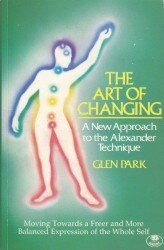Re-Membering: including emotions with body and mind
Re-membering?
One of the first books I read about the Alexander Technique, The Art of Changing, still inspires fresh thoughts. I recently took Glen Park’s book off the shelf (FYI in other additions is titled A New Approach to the Alexander Technique). In it I found a section on Emotional Armouring.
“Because the mind, body and emotions are all different expressions of the Self, the whole, they cannot be split off from each other, and our attempts to cut off emotions will be reflected in the body and the mind”.
I was particularly drawn to the word “re-membering”, used as a way to describe connecting the dis-membered self back into unity. This past week’s lessons and classes have focused on appreciating changes in the emotional life of the Self, the Unified Self, which is at the center of our approach to the Alexander Technique, here at AT Motion.
More to share & something you can do for yourself
Take a few minutes to observe yourself before and after each AT lesson or class. Taking notes will give you time to prepare, and then time to integrate or reflect on your experiences -- deepening them in your memory. I recommend using three categories of observations from Glen Park’s book: sensations, emotions and thoughts.
Sensations: Notice your sensations before you try to change them. It’s so compelling to fix what feels wrong or uncomfortable. Sensation is the physical intelligence data that you need to make informed decisions. You are developing the skill of making more sense of your sensations. Sensing the space around you will also reveal your personal sensations. Take a few moments to notice and then to take notes brings language to your non-verbal experiences, helping you to communicate how something affects you, even if you have to invent the words.
Emotions: Internal sensation is the basis of emotion -- it’s how we know that we are having feelings. You may notice your emotions as an overall emotional quality or mood. If you can, take time to get to know the feelings -- record them in words or drawings. Pleasurable and painful feelings can arise unexpectedly, seemingly uninvited. Emotions connected to past experiences that have not yet been expressed and released will often latch onto new but similar experiences in the present moment. If you are working through some historical/past distress, you may want to take a moment to regain balance in your attention. Notice least one pleasant thing in the surrounding place or room. Exhale softly and slowly, then let in an easy inhale so you can sigh. Taking a few moments to observe and record your emotions or mood before and after a lesson can build confidence, trust in yourself and honesty with others.
Thoughts: Sensations and emotions are reflective of the beliefs and ideas we live by. In an Alexander Technique lesson, changes or shifts from familiar ways of moving and being can provoke thoughts. You might find yourself creating inner monologues or scenarios. You might hear very critical thoughts playing out in your head, or “rules” about what is or isn’t possible. You might come up with a new idea, find an inspiration or a very deep understanding. Perspective can shift. Any thought that has a particular quality or flavor is worth noticing - and taking notes.
All of these ways of appreciating your experience will build more accurate observation skills while you re-member. And done with kindness, you will build respect for our human design for …being human!
Photo by Max Kleinen on Unsplash


